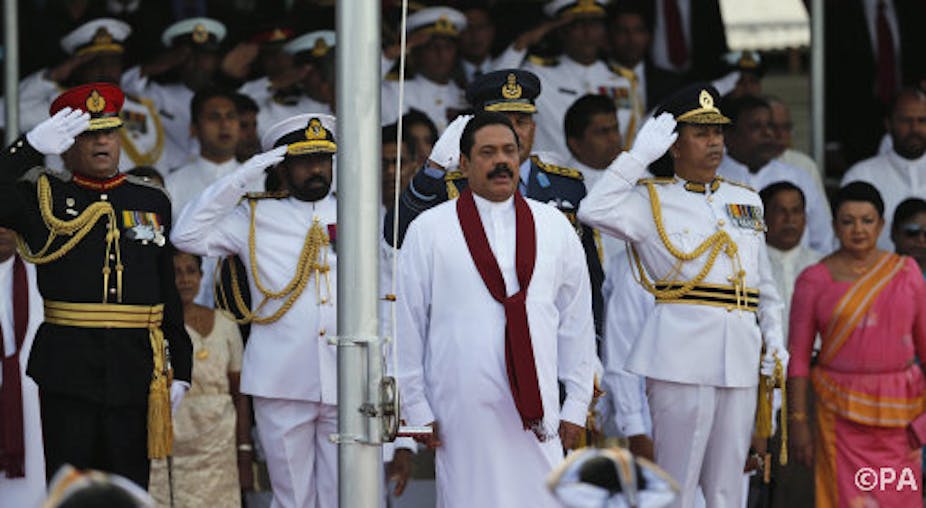When delegates assemble in Colombo later this month for the Commonwealth Heads of Government (CHOGM), much of the talk at the summit will be of “moving forward” and of “reconciliation”. The government will highlight evidence of reconstruction in the war-torn north of the county.
But two big questions will be studiously avoided at diplomatic receptions. Nobody will want to talk about the tens of thousands of civilians that the army is alleged to have killed in the final days of war in 2009. And the government’s continuing assault on Sri Lanka’s democratic freedoms will go largely unremarked.
Sri Lanka has won the war against the Tamil Tigers, but runs the risk of sliding into authoritarian rule.
Sri Lanka is one of the oldest democracies in the Commonwealth, with an unbroken record of regular elections dating back to 1931. Its democratic tradition, buttressed by a largely independent judiciary and a lively press, survived a 30-year war with the Liberation Tigers of Tamil Eelam (LTTE). But since the coming to power of the current president, Mahinda Rajapaksa, in 2005, pressure on journalists, political opponents, and independent judges has become intense.
Rajapaksa heads the biggest government in the world, with more than 100 ministers and deputy ministers in office. In reality, this is simply a vast network of patronage and control – politicians only thrive if they are inside this ruling club. The real government is much smaller, concentrated around three Rajapaksa brothers, who manage nearly 50% of the state budget between them.
Jobs for the boys
The president’s brother, Gotabhaya, who survived an LTTE terrorist attack in 2006, presides over the powerful defence ministry. Another brother, Basil, is effectively in charge of the economy, as minister for economic development. Just to round things off, elder brother Chamal holds the post of parliamentary speaker, while Mahinda’s son is also a member of parliament.

Serious challenges to this emerging dynasty have not been tolerated. Former army chief Sarath Fonseka, a one-time ally of the president, ran against him in the 2010 elections, but ended up spending two years in prison on politically-motivated charges.
Checks and balances on the government have gradually been dismantled. The judiciary has lost much of its independence. The 18th amendment to the Constitution – ratified in 2010 – abolished an independent judicial appointments body and instead gave those powers to the president. In a final blow to the judiciary, parliament impeached an independent-minded chief justice in January 2013, after she presided over a judicial decision that went against the government.
The independent press has also been cowed. Since 2005 at least a dozen journalists have been killed; others have disappeared or fled into exile. There has been no progress in finding the killers of Sunday Leader editor Lasantha Wickrematunga, shot dead in 2009 after writing a letter to be published in his newspaper predicting his own death.

His successor as editor, Frederica Jansz, also faced death threats and was sacked in 2012 after pro-government business interests bought the newspaper. Journalists on Tamil newspapers are particularly vulnerable. The Jaffna-based Uthayan has been a frequent target. In April 2013 arsonists set fire to its presses; its journalists frequently face beatings, harassment and worse; five have been killed since 2002.
Tamil unrest
Meanwhile, the government has not offered any serious political solution to Sri Lanka’s embattled Tamil minority, who have exchanged the brutality of LTTE rule for the uncertainties of life under the Sri Lankan military. But one source of optimism is the election held to the Northern Provincial Council in September 2013. The nationalist Tamil National Alliance thoroughly trounced pro-government parties, winning nearly 80 per cent of the vote.
Moderate members of the government hope that channelling Tamil demands through the political process in this way will prevent any resurgence of armed insurgency or terrorism. Tamil activists hope that the election will help to resurrect Tamil demands for some measure of self-determination.

But at present the whole of the Northern Province is effectively under military rule. The provincial council is unlikely to gain crucial powers over policing and land rights. It runs the danger of becoming a largely virtual body, while government funding and military power bypass local government.
The Rajapaksas have understood the lessons of modern authoritarianism: control of finance, the judiciary, the police, and the media are more important than winning every local election. But it is hard to envisage a peaceful future for the island unless this democratic experiment in the north can be made to work. And that means boosting constitutional governance not only in the north, but throughout the island, with a free press, an independent judiciary and a strong political opposition holding the government to account.
The decision to hold CHOGM in Colombo was wrong-headed and counterproductive. The Commonwealth’s credibility as an upholder of human rights has been badly damaged. Calls to boycott the event have been heeded only by Canadian prime minister Steven Harper. The least that delegates such as David Cameron can do is to highlight publicly the dangers that Sri Lanka’s creeping authoritarianism poses to the country’s future.

